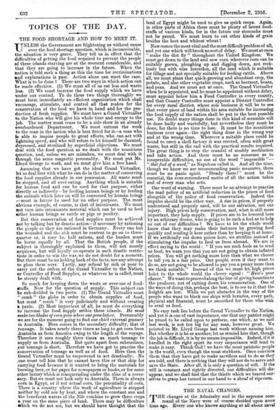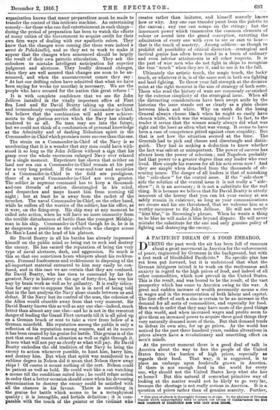THE NAVAL CHANGES. T HE changes at the Admiralty . and in
the supreme com- mand of the Navy were of course decided upon some time ago. Every one who knows anything at all about naval organization knows that many preparations must be made to transfer the control of this intricate machine. An entertaining comedy—for those who can find entertainment in such things— during the period of preparation has been to watch the efforts of many critics of the Government to acquire credit for their own firm ways of dealing with our apathetic rulers. They knew that the changes were coming (for these were indeed a secret de Pohehine11e), and so they set to work to make it appear that the changes when announced should be largely the result of their own patrotic stimulation. They ask the onlookers to mistake intelligent anticipation for superior judgment and alertness. They loudly demand changes, when they are well assured that changes are soon to be an- nounced, and when the announcement comes they say : " At last our drifting rulers have admitted that what we have been saying for weeks (or months) is necessary. We are the people who have secured for the nation this great reform 1 " It is with complete confidence that we see Sir John Jellicoe installed in the vitally important office of First Sea Lord and Sir David Beatty taking up the arduous and tremendously responsible office of Commander-in-Chief. We believe that the combination will add new achieve- ments to the glorious service which the Navy has already rendered to us all. No man may see into the future, but we could not think of a combination of personal knowledge at the Admiralty and of dashing Nelsonian spirit in the Commander-in-Chief which promises more success than this one.
The strain on a Commander-in-Chief of the Navy is so unrelenting that it is a wonder that any man could have with- stood it so long as Sir John Jellicoe without a sign that his grasp over the whole enormous enlarged Navy ever relaxed for a single moment. Experience has shown that neither on land nor sea can a Commander-in-Chief remain at his post for a very long period. If the wear-and-tear and anxieties of a Commander-in-Chief in the field are prodigious, those of a naval Commander-in-Chief are even greater. The soldier in supreme command has to keep a thousand- and-one threads of action disentangled in his mind, and despatches and maps haunt him from morning till night ; but at least he is away from the racket of the trenches. The naval Commander-in-Chief, on the other hand, while he suffers all the worries of the soldier, has his office, as it were, on the firing-step. His ship may at any moment be called into action, when he will have no more immunity from the terrible disturbances of battle than the youngest Midship- man in his ship. Commander-in-Chief though he is, he is in as dangerous a position as the subaltern who charges across No-Man's-Land at the head of his platoon.
Sir David Beatty in all his battles has already impressed himself on the public mind as being out to seek and destroy the enemy. He has earned the reputation of being the very type of naval alertness, dash, and aggression. So much is this so that one sometimes hears whispers about his reckless- ness. Personal fearlessness and recklessness in disposing of the all-important material entrusted to him may easily be con- fused, and in this case we are certain that they are confused. Sir David Beatty, who has risen to command by far the greatest Navy in history at the age of forty-five, has won his way by brain work as well as by gallantry. It is really ridicu- lous for any one to suppose that he is in need of being told that in the last analysis the Navy alone stands between us and defeat. If the Navy lost its control of the seas, the cohesion of the Allies would crumble away from that very moment. Sir David Beatty knows this as well as any one else—indeed, much better than almost any one else—and he is not in the remotest danger of leading the Grand Fleet onwards till it is all piled up on a German beach or sent to take a view from below of a German minefield. His reputation among the public is only a reflection of his reputation among seamen, and at its source it has been created by his genius for battle. This genius is of the sort that sees all round a situation as well as right through it. It sees what will not pay as clearly as what will pay. Sir David Beatty embodies the old tradition of the Navy to bring the enemy to action whenever possible, to hunt him, harry him, and destroy him. But when, that spirit was manifested to a sublime degree in Nelson did it mean that Nelson threw away ships ? Of course it meant nothing of the sort. Nelson could he patient as well as bold. He could wait like a cat watching a -mouse till the conditions suited him ; he could refuse action in order that a better occasion should come when his devouring determination to destroy the enemy could be satisfied with all the chances in his favour. There is something in the genius for battle which seems to be a metaphysical quality ; it is intangible, and forbids definition : it is com- parable with the touch of the painter or the violinist who creates rather than imitates, and himself scarcely knows how or why. Any one can transfer paint from the palette to the canvas ; any one can scrape on the strings ; but the innermost power which transmutes the common elements of colour or sound into the grand conception, extorting the admiration of every one with eyes to see or ears to hear— that is the touch of mastery. Among soldiers—as though to prohibit all possibility of critical dissection—strategical and tactical genius has often been found in a brain of ordinary and even inferior attainments in all other respects. It is the part of wise men who do not fight in ships to recognize the true "touch" when they see it, and to use it to the full.
Ultimately the artistic touch, the magic touch, the lucky touch; or whatever it is, is of the same sort in both sea fighting and land fighting. To throw your full strength at the decisive point at the right moment is the aim of strategy of both sorts. Those who read the history of wars are commonly astonished by the extreme simplicity of the strategical issue. When all the distracting considerations have been swept aside by the historian the issue stands out as clearly as a plain choice between black and white. Why on earth did the losing General always choose black when he might so easily have chosen white, which was the winning colour 'I In fact, to the reader it seems that the winner nearly always did what was right and the loser as often what was wrong. It seems to have been a case of competence pitted against crass stupidity. But that is not how the situation seemed at the time. The Generals had to pick and choose and disentangle and distin- guish. They had in making a deduction to know whether the fact was salient or unimportant. The power of success has always been the power of selection ; and Napoleon probably had that power to a greater degree than any leader who ever lived. How simple his reasons for all his acts seem now 1 And they are simple when detached from the thousands of ob- scuring issues. The danger of all leaders is that of mistaking the " side-show" for the central issue. If the " side-show aids the solution of the central issue it is not really a " side- show" ; it is an accessory ; it is not a substitute for the real thing. It is because we believe that Sir David Beatty is utterly innocent of the heresy that you can let your enemy at sea safely remain in existence, so long as your communications are secure and his are threatened, that we welcome him as a. worthy successor to Sir John Jellicoe. He will not merely " hint blue," in Browning's phrase. When ho wants a thing to be blue he will make it blue beyond dispute. He will never mistake the substitute for the one and only genuine policy of fighting and destroying the enemy.













































 Previous page
Previous page